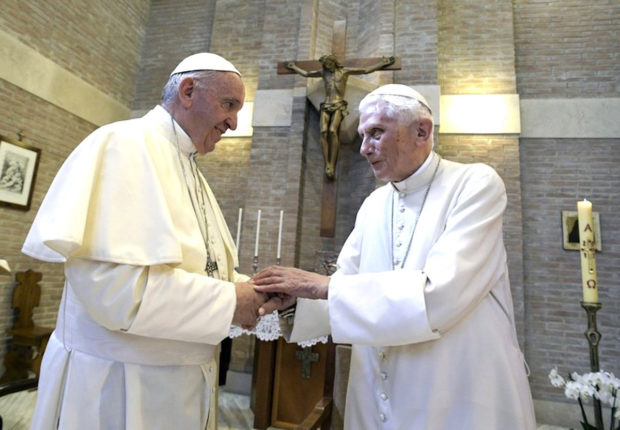
In this June 28, 2017, file photo, Pope Francis, left, and Pope Benedict XVI, meet each other on the occasion of the elevation of five new cardinals at the Vatican. Retired Pope Benedict XVI has broken his silence to reaffirm the value of priestly celibacy, co-authoring a bombshell book at the precise moment that Pope Francis is weighing whether to allow married men to be ordained to address the Catholic priest shortage. L’Ossevatore Romano/AP PHOTO
NEW YORK—Sex, it seems, remains the bugbear of the Vatican.
Rome may not have been built in a day, but you would think, from the current brouhaha over contending views on the question of priestly celibacy, that it could crumble due to that which makes the world go ‘round.
Birds do it, bees do it, and certainly man and woman do it, else we would not be here. The forbidden fruit from the tree of knowledge that Adam and Eve bit into must have been a powerful aphrodisiac, as it made each “aware of their nakedness,” as Genesis diplomatically puts it. Whatever was in that fruit (or put into by the talking serpent) awakened their libido. Thus do Adam and Eve get the hots for each other. Thus do this post-Edenic couple mutate into our mythological primeval parents.
Original sin then may lie in biological desire for whichever gender or genders turn you on, that desire being the engine towards perpetuating humankind. If so, no amount of being bathed in holy water will alter that.
Of course there is good reason to be wary of the sexual drive for, rooted in the instinct to survive, it can and has been an all-powerful force, both for creation and destruction. Arguably the most infamous instance in history is the seduction and abduction of Helen—she whose face launched a thousand ships—leading to the Trojan War and the fall of Troy, which then circuitously leads to the founding of Rome. In a very real sense, the Eternal City can be said to have arisen from the ashes of an illicit love. What is amor after all but just another way of spelling Roma?
The current Bishop of Rome, a/k/a Pope Francis, has been considering relaxing the tradition of celibacy for its priests, to allow married clerics to serve in certain underserved regions such as the Amazon in Latin America. As head of the RCC, Francis has the power to do so, and not just for designated areas but to decree that celibacy will no longer be a requirement for the priesthood.
This is where it gets complicated.
Francis’s predecessor, Benedict XVI, who resigned in 2013, the first pope to do so since Gregory XII in 1415, with the title of Pope Emeritus, has contributed an essay in defense of priestly chastity to Des Profondeurs de Nos Coeurs (From the Depths of Our Hearts), a just published book, written principally by Robert Cardinal Sarah, of Guinea, a prominent conservative cleric. Benedict writes that for priests there is the “impossibility of a marital bond,” renouncing marriage is a “criterion for priestly ministry,” and for priests to serve God, “celibacy becomes really essential.”
But priestly celibacy, it turns out, is not a matter of doctrine, but a discipline, a traditional ascetic practice. Church dogma in fact does not forbid priests from matrimony. The apostles themselves were married. Prior to the 5th century CE, priestly marriage was not uncommon. And married clerics from, say, the Anglican faith who convert to Catholicism, may continue in their priestly functions.
This past November, at a synod of bishops in Rome, 128 voted in favor of married men of good standing being admitted to the priesthood in Latin America, with 41 against. This is a position closer to the current pope’s views but diametrically opposed to that of his predecessor. That recommendation could become church law, should Pope Francis say so.
The differences between the two pontiffs are examined in The Two Popes, a Netflix-produced feature film starring Jonathan Pryce as Francis and Anthony Hopkins as Benedict. The film, largely a biopic of Francis, mostly deals with the two men’s personalities and styles, their ideological and theological divergences cursorily dealt with.
The Two Popes ends with the two watching the World Cup final of 2014, with Germany playing against Argentina and winning. Side by side, the two men cheer their respective teams on. It is a feel-good moment that suggests this papal competition is a friendly one.
Nothing could be further from the truth. Last year, a Vatican conference dealing with the church’s long-standing problem of clerical sex abuse placed the blame squarely on the abuse of power by priests. However, in a 6,000-word letter, Benedict weighed in, essentially laying the blame elsewhere: on the ‘60’s sexual revolution and the liberal reforms brought about by the Second Vatican Council.
To Benedict and the conservative bloc at the Vatican, sex is the devil, and to allow priests to marry is to allow the devil entry—the slippery slope upon which, they fear, this patriarchy may soon find itself under the guidance of Pope Francis. It’s a backward, regressive stance, one that castigates the very genesis of humanity.
Now that, it seems to me, is the devil’s work. Copyright L.H. Francia 2020

